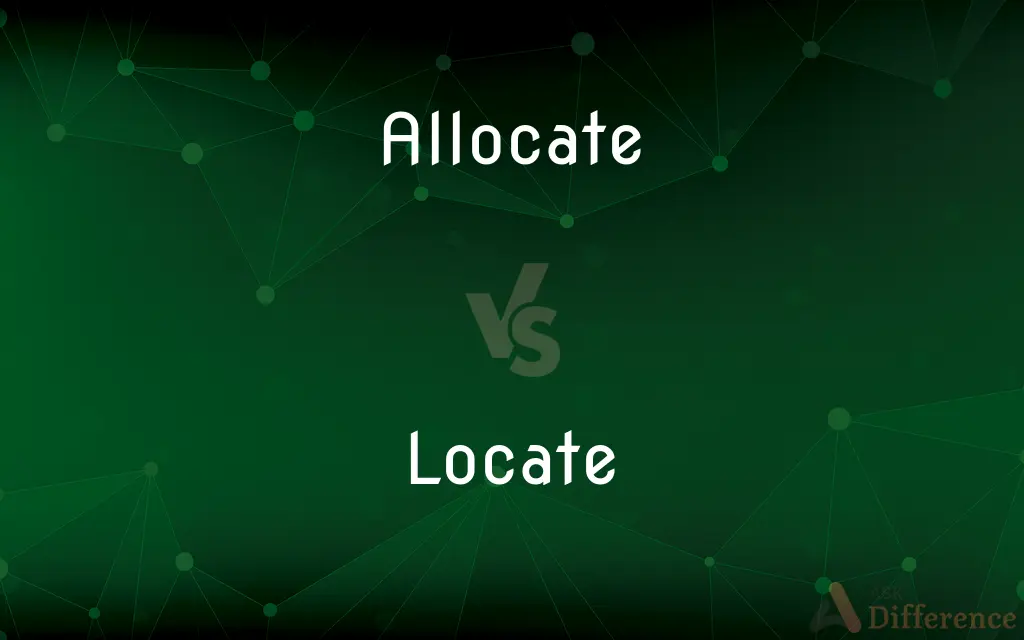Allocate vs. Locate — What's the Difference?
Edited by Tayyaba Rehman — By Urooj Arif — Updated on March 10, 2024
Allocate involves distributing resources or tasks, while locate means to find or establish the position of something.

Difference Between Allocate and Locate
Table of Contents
ADVERTISEMENT
Key Differences
To allocate is to distribute resources, tasks, or time among various projects, departments, or individuals based on need or strategy. It involves decision-making on how best to use limited resources. Locate, on the other hand, refers to the act of finding something's position, place, or situation, often involving a search or discovery process.
Allocation often requires a plan or a system to determine where resources should go to maximize efficiency or meet specific objectives. This process can involve budgeting, scheduling, or assigning responsibilities. Whereas locating something doesn’t necessarily involve planning but rather searching or identifying a specific location or existence of an object or place.
In business, allocating resources can be a complex task that involves understanding the needs of different departments and projects and making informed decisions to support organizational goals. Locating, in a business context, could involve finding physical assets, determining the geographical location of market opportunities, or identifying where certain processes take place within an organization.
Allocating is an ongoing process that may be adjusted as needs and priorities change. It's about managing resources effectively over time. Locating, however, is generally a one-time action that concludes once the object or place has been found, although it can be part of a larger process such as research or investigation.
While allocation is about distribution and management of resources, locating is about discovery and identification. For instance, a project manager might allocate tasks to team members while also needing to locate information or assets necessary for project completion.
ADVERTISEMENT
Comparison Chart
Definition
Distributing resources or tasks among different entities
Finding the position or situation of something
Focus
Resource management and distribution
Discovery and identification
Process
Involves planning and decision-making
Involves searching or identifying
Context
Often used in management, budgeting, and planning
Used in various contexts from geography to information retrieval
Outcome
Effective use of resources to meet objectives
Determination of the position or existence of something
Compare with Definitions
Allocate
To distribute resources or tasks among various entities based on need or strategy.
The team leader decided to allocate more developers to the critical project.
Locate
To find or establish the position, situation, or whereabouts of something.
The app helps users locate nearby restaurants.
Allocate
Involves decision-making on resource distribution.
The budget was allocated carefully across all departments.
Locate
Broad, from geography to information retrieval.
The scientist used satellite data to locate the migration patterns of whales.
Allocate
Requires planning and understanding of needs.
Time was allocated for each phase of the project to ensure timely completion.
Locate
Involves searching or identification.
He was able to locate the missing file in the archive.
Allocate
Aims for efficient and strategic use of resources.
The new software helped allocate tasks more efficiently among team members.
Locate
Finding the specific location or existence of something.
With the new system, it was easier to locate errors in the code.
Allocate
Common in business, project management, and budgeting.
Resources were allocated based on the strategic priorities of the company.
Locate
May use various methods from physical search to technological tools.
The detective used clues to locate the suspect's hideout.
Allocate
To set apart for a special purpose; designate
Allocate a room to be used for storage.
Locate
Discover the exact place or position of
Engineers were working to locate the fault
Allocate
To distribute according to a plan; allot
Allocate rations for a week-long camping trip.
Locate
To determine or specify the position or limits of
Locate Albany on the map.
Managed to locate the site of the old artists' colony.
Allocate
To set aside for a purpose.
Please do not eat the meringue, as it is allocated for the dinner party tomorrow.
Locate
To find by searching, examining, or experimenting
Locate the source of error.
Allocate
To distribute according to a plan, generally followed by the adposition to.
The bulk of K–12 education funds are allocated to school districts that in turn pay for the cost of operating schools.
Locate
To place at a certain location; station or situate
Locate an agent in Rochester.
Allocate
(computing) To reserve a portion of memory for use by a computer program.
Locate
To become established; settle
New businesses that have located in town.
Allocate
To distribute or assign; to allot.
Locate
(transitive) To place; to set in a particular spot or position.
Allocate
To localize.
Locate
(transitive) To find out where something is located.
Allocate
Distribute according to a plan or set apart for a special purpose;
I am allocating a loaf of bread to everyone on a daily basis
I'm allocating the rations for the camping trip
Locate
(transitive) To designate the site or place of; to define the limits of (Note: the designation may be purely descriptive: it need not be prescriptive.)
The council must locate the new hospital
To locate a mining claim
To locate (the land granted by) a land warrant
Locate
To place oneself; to take up one's residence; to settle.
Locate
To place; to set in a particular spot or position.
The captives and emigrants whom he brought with him were located in the trans-Tiberine quarter.
Locate
To designate the site or place of; to define the limits of; as, to locate a public building; to locate a mining claim; to locate (the land granted by) a land warrant.
That part of the body in which the sense of touch is located.
Locate
To discover the location or site of; as, to locate the source of a radio transmission; to locate a leak; to locate the malfunction in a system.
Locate
To place one's self; to take up one's residence; to settle; as, to locate in Seattle.
Locate
Discover the location of; determine the place of; find by searching or examining;
Can you locate your cousins in the Midwest?
My search turned up nothing
Locate
Determine or indicate the place, site, or limits of, as if by an instrument or by a survey;
Our sense of sight enables us to locate objects in space
Locate the boundaries of the property
Locate
Assign a location to;
The company located some of their agents in Los Angeles
Locate
Take up residence and become established;
The immigrants settled in the Midwest
Common Curiosities
Can allocate and locate be used interchangeably?
No, allocate is about distributing resources or tasks, while locate is about finding the position of something.
Can technology aid in both allocating and locating?
Yes, technology can assist in efficiently allocating resources and locating items, places, or information.
Is locating always a physical action?
No, locating can refer to finding information, identifying a position in data, or establishing the existence of something, not just physical locations.
Can allocation decisions be reversed?
Yes, allocation decisions can often be revised based on changing needs, priorities, or outcomes.
How does the ability to locate information quickly benefit businesses?
Quick access to information can lead to better decision-making, improved customer service, and increased efficiency.
Are there tools specifically designed for allocation or location tasks?
Yes, there are various tools and software designed to assist with allocation tasks (like resource management software) and location tasks (like GPS and mapping software).
How does allocation affect productivity?
Proper allocation of resources can significantly improve productivity by ensuring tasks are completed efficiently and effectively.
How does one determine the best allocation of resources?
The best allocation is determined by evaluating needs, priorities, and the potential impact on goals and objectives.
Can the difficulty of locating something affect a project's timeline?
Yes, difficulties in locating necessary information or resources can delay project progress.
Are there industries where allocation is more critical than in others?
Allocation is particularly critical in industries with limited resources, such as healthcare, project management, and manufacturing.
Is allocating resources a one-time task?
No, allocating resources is an ongoing process that may be adjusted as needs and priorities change.
How important is the role of planning in allocation?
Planning is crucial in allocation to ensure resources are distributed effectively to meet goals and objectives.
Can you locate something without searching for it?
Typically, locating involves some form of search or identification process, whether active or passive.
Is locating an item the final step in a process?
Locating can be a final step or part of a larger process, depending on the context and objective.
Can improper allocation lead to resource wastage?
Yes, improper allocation can result in inefficient use of resources, leading to wastage and reduced effectiveness.
Share Your Discovery

Previous Comparison
Anyone vs. Someone
Next Comparison
Crystal vs. GrainAuthor Spotlight
Written by
Urooj ArifUrooj is a skilled content writer at Ask Difference, known for her exceptional ability to simplify complex topics into engaging and informative content. With a passion for research and a flair for clear, concise writing, she consistently delivers articles that resonate with our diverse audience.
Edited by
Tayyaba RehmanTayyaba Rehman is a distinguished writer, currently serving as a primary contributor to askdifference.com. As a researcher in semantics and etymology, Tayyaba's passion for the complexity of languages and their distinctions has found a perfect home on the platform. Tayyaba delves into the intricacies of language, distinguishing between commonly confused words and phrases, thereby providing clarity for readers worldwide.














































